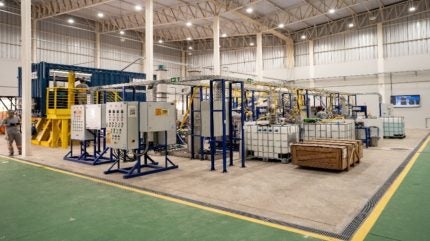
Rare earths company Aclara Resources has officially inaugurated its semi-industrial heavy rare earths pilot plant facility in Aparecida de Goiania, Goias, Brazil.
The plant is expected to process around 200 tonnes (t) of clays to produce an estimated 150kg of heavy rare earth carbonates including dysprosium and terbium.

Discover B2B Marketing That Performs
Combine business intelligence and editorial excellence to reach engaged professionals across 36 leading media platforms.
The pilot plant showcases Aclara’s circular mineral harvesting technology, which is at the core of the company’s Carina project in Brazil.
This technology is designed to optimise processes, reduce operating costs and increase the purity of the final product.
It includes shallow excavation without blasting, elimination of energy-intensive crushing or milling, zero liquid discharge, no tailings dam requirement, more than 95% water recirculation and 99% recovery of primary reagents.
The pilot plant builds on previous piloting efforts in Chile, where 25t of clays from the Carina project were processed. It aims to validate the optimised closed-circuit flowsheet at a semi-industrial scale.

US Tariffs are shifting - will you react or anticipate?
Don’t let policy changes catch you off guard. Stay proactive with real-time data and expert analysis.
By GlobalDataThese efforts support the upcoming pre-feasibility and feasibility studies, both led by Hatch.
The plant also aims to produce high-purity heavy rare earth carbonate for future separation plants in the US and to support offtake agreements.
The environmental sustainability of the process design will be demonstrated to stakeholders, with the processed clays being chemically stable for full reforestation.
Aclara CEO Ramón Barúa said: “We extend our most sincere gratitude to the Brazilian authorities and the community of Nova Roma for their extensive support and shared commitment to accelerating the implementation of the Carina project. During the inauguration, they experienced firsthand our unique proprietary technology, witnessing how clean and simple our process is for producing critical heavy rare earths such as dysprosium and terbium.
“The Carina project’s future production of these key elements will enable the fabrication of approximately five million electric vehicles per year, positioning Goias at the forefront in the global energy transition.”
The proposed process flowsheet is protected by two patents, with the first granted in Chile, Brazil, the US and China, and the second patent pending approval.
State of Goiás Vice-Governor Daniel Vilela said: “With an estimated investment of $2.8bn reais ($500m), the project will create thousands of jobs and position our state as a leader in the production of rare earths – strategic minerals for the future of clean technologies such as electric vehicles and wind energy.”
Last year, in December, the company secured $25m (23.36bn pesos) through a non-brokered private placement to fund its Carina project.





